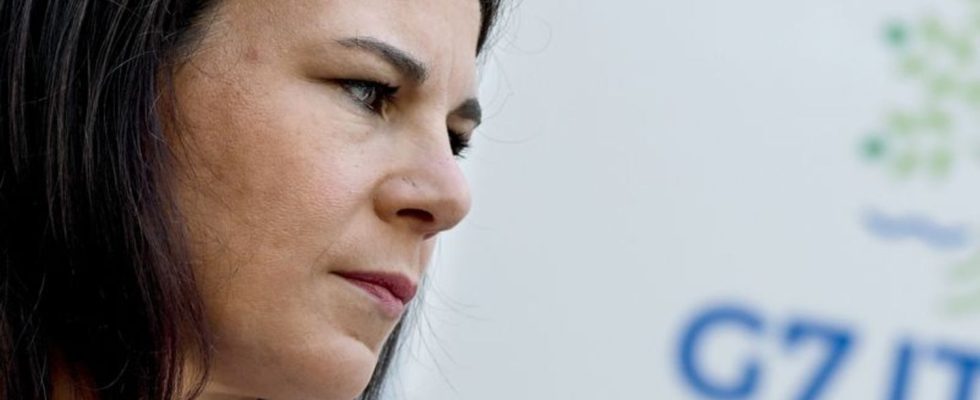Conflicts
G7 sets an example for Ukraine and the Middle East
Federal Foreign Minister Annalena Baerbock at the meeting of the G7 foreign ministers in Capri. photo
© Britta Pedersen/dpa
The group of economically strong democracies is campaigning for more air defense for Kiev and greater isolation of Tehran. It should be a signal to Moscow and the mullahs. Does it work?
Given the wars in the… The Group of Seven major Western industrial nations (G7) wants to send a signal of support to Ukraine and the Middle East.
At their spring meeting on the Italian Mediterranean island of Capri, the G7 foreign ministers discussed further military support for Kiev against Russian air strikes. In addition, after the major Iranian attack on Israel, there were further sanctions against Tehran – also with the aim of deterring Prime Minister Benjamin Netanyahu from a large-scale counterattack.
At the meeting, which lasted until Friday, Foreign Minister Annalena Baerbock (Greens) called on partners to provide Ukraine with additional air defense systems. Germany is currently preparing to deliver a third Patriot system.
Italy currently chairs the group. Other members include the USA, Canada, Great Britain, France and Japan. The EU is represented at all meetings. For the first time, NATO Secretary General Jens Stoltenberg was there as an official guest. He called on the allies to supply additional air defense systems for Ukraine.
Baerbock on the Middle East: Isolate Iran more
On the second major topic of the meeting, the situation in the Middle East, Baerbock called for a tougher course against Tehran. “Iran must be isolated. And at the same time there must be no further escalation.” She added: “That would be fatal for people: in Israel, in the West Bank, in Lebanon, in the entire region.” Israel, which repelled the attack at the weekend with the help of partners in the region, achieved a “defensive victory”. “And now we have to secure it diplomatically.”
The host of the meeting, Italy’s Foreign Minister Antonio Tajani, assured Israel of support on behalf of all G7 countries. At the same time, he urged both sides to de-escalate. There are fears that a major Israeli counterattack in the region will lead to a conflagration that will extend far beyond the Gaza war that has been going on for six months.
In the debate about further sanctions against Iran, EU Foreign Affairs Representative Josep Borrell spoke out in favor of finally implementing or expanding existing punitive measures for the delivery of drones to Russia. The USA and Great Britain have already imposed sanctions against Tehran. The US punitive measures target Iran’s drone program, the steel industry and automobile manufacturers. The EU could impose further sanctions next week.
Baerbock sees hopeful signs from the USA
Baerbock also advocated the delivery of additional Patriots to the attacked Ukraine at a two-way meeting with her US colleague Antony Blinken. She previously said: “In these stormy times, it is a hopeful sign that there are now signals from the US from Republicans that support for Ukraine can continue to be intensive.” The US House of Representatives is expected to vote on Saturday on a $61 billion (about 57 billion euros) aid package that has long been blocked by Republicans.
Kuleba to USA: Finally pass aid package
Blinken also met with Ukrainian Foreign Minister Dmytro Kuleba. It is “urgent that all friends and supporters of Ukraine maximize their efforts to give Ukraine what it needs to continue to effectively defend itself against this Russian aggression.” Kuleba reported that they discussed bringing more Patriot air defense systems and missiles to Ukraine as quickly as possible. He appealed to the US Parliament to pass the aid package. “This will be a sign of strength and confidence and will allow Ukraine to save lives and improve the situation on the battlefield.”
Stoltenberg said that given the situation after more than two years of Russian aggressive war, there was an “urgent need for more air defense.” He spoke of “encouraging signals” within NATO in favor of Ukraine. Stoltenberg was referring to the federal government, but also to new promises of aid from the Netherlands and Denmark. With the appeal for further deliveries, he also referred to G7 countries such as France and Italy.
EU Foreign Affairs Representative Borrell: Act quickly
Borrell warned: “Concrete decisions must be made in the next few days to send more air defense to Ukraine.” The EU should not rely solely on Washington, but must take responsibility. “We have Patriots. We have anti-missile systems. We have to take them out of our barracks, where they are, and send them to Ukraine, where the war is raging.”
The G7 foreign ministers meet two or three times a year. The annual G7 summit of heads of state and government takes place in southern Italy in mid-June.

